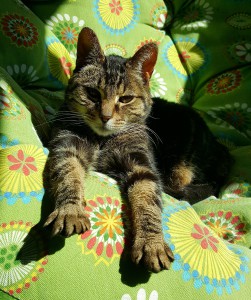As our kittys age, physical and mental changes occur just as they do with people. Their metabolism may change, they sleep more deeply and may not be able to jump as high as they once did when they were younger. This being said, cats should be seen more often than once a year (recommendation is every 6 months) as they begin to age, usually around the age of 7 years of age.
It is always easier to treat a disease if caught early on and cats often do a great job at hiding some of these changes. They may often be subtle changes that we chalk up to slowing down due to age but these changes could also be due to a medical issue.
Signs to watch for as our feline friends age:
Changes in Senses: Vision, hearing and taste may affect our senior cats. You may not even notice these slow, subtle changes as cats tend to easily compensate for them early on.
Any time the cat’s sense of taste and smell have altered, food may not be as appetizing as it once was. If your kitty is not eating, try warming up canned food a tiny bit to see if the smell and taste are more appealing.
Behavioral changes: Cats often mellow with age and spend more time sunbathing and lounging on our laps. They tend to be less curious. If your cat is normally cranky and that personality changes, this warrants concern. Same goes for a cat that is generally very sweet then suddenly becomes more cranky. The elderly felines do not handle stress well so if you are thinking about adding a kitten, this may not be the best idea. Senility can also affect cats though it is not as common as it is for dogs. Things you may notice, if they forget how to use the litter box, forget where the box is, or walk around disoriented you should check with your veterinarian about health concerns.
Most common health issues we see in cats are related to kidney and thyroid issues. The most common thyroid problem in older cats is hyperthyroidism (an overproduction of thyroid hormone). If left untreated, heart and liver problems will occur causing the cat to become more sick. There are treatment options available; Radiotherapy, surgery, medication and most recently available, and iodine-restricted dietary management. Check with your veterinarian for the best option for your feline companion as each case varies.
Urinary issues also affect our senior felines. Sometimes chronic (slow and long term) or acute (rapid onset and urgent). Treatments vary depending on specific case.
Bad breath, tartar and gum inflammation may be a sign of tooth damage, periodontal disease, oral cancers or ulcers and even systemic health issues in our feline friends. Your veterinarian will discuss any concerns noted on physical exam.
We know this is hard to believe, but Hypertension (high blood pressure) is fairly common in our senior cats. Many diseases can be associated with hypertension.
Arthritis can affect our senior felines just like people. They may require assistance getting up onto surfaces or even into their litter boxes. Stairs can become problematic as our feline friends age, so take where their litter box is located into consideration. You may also need to get creative in the type of litter box you have, sometimes these arthritic kids have a hard time getting into a box that has high sides for them to step over. A paint tray or cookie sheet offer easier entry.
Diet and keeping our cats at a normal weight is important. Overweight felines generally have a shorter lifespan than those that are at a normal weight. As with humans, extra weight can cause other health concerns as well. Today’s feline life expectancy is approximately 20 years. Enjoy this special time with your kitty and pay special attention to any subtle changes.

